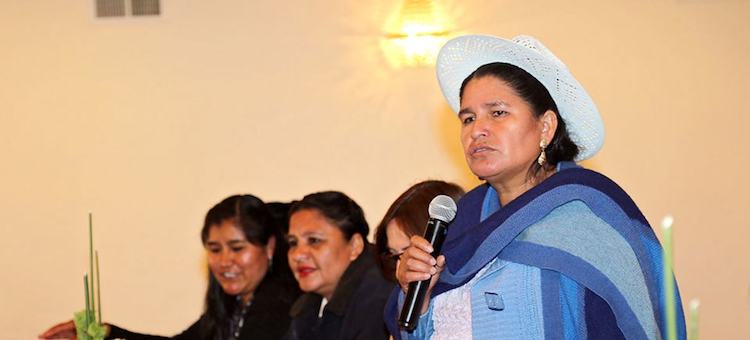By Thalif Deen
UNITED NATIONS, 17 June 2023 (IDN) — Shirley Chisholm, the first Black American woman elected to the US Congress back in 1972, once famously remarked: “If they don’t give you a seat at the table, bring a folding chair.”
The legendary remark was a reflection of the gender bias in the US where women were discriminated against in the social and political life of the country.
But, regrettably, nearly four decades later, the battle is still on, worldwide.
Volker Türk, the UN High Commissioner for Human Rights, said last week that gender-based biases in public and political life against women remain deeply entrenched globally, and urgent action is needed to accelerate progress towards full participation of women.
“Patriarchy must be a thing of the past. Our future depends on women and girls being at the table everywhere when decisions are made,” he said June 15, as the UN commemorated the 75th anniversary of the Universal Declaration of Human Rights.
“It was only last year that for the first time in history women were represented in every functioning parliament in the world,” Turk pointed out.
“Yet today, still, only one in four parliamentarians are women. At the current rate of change, it would take 155 years for women to close the gender gap. This struggle is even harder for historically marginalized women, whose representation lags behind,” he added.
“Simply said, this is a wake-up call. Parity can’t wait. Equal and meaningful participation of women in practice isn’t just about women’s rights to be heard, it is about our societies’ ability to tackle the most pressing crises confronting our world today”, he declared.
“It is imperative that we harness the full potential and collective contribution of all of humanity to take effective action to protect the planet, to secure lasting peace, and to achieve the Sustainable Development Goals.”
Niki Kandirikirira, Director of Programmes at Equality Now, told IDN gender parity is not just about fairness, it is a vital component for establishing a more equitable and prosperous society.
When women have equal representation and participation, she argued, it provides a wider diversity of experience and expertise that strengthens decision-making and fosters better outcomes for all.
And women in positions of influence can be positive role models, helping to erode harmful gender stereotypes and inspire other women and girls to pursue their ambitions.
“While there has been some progress in advancing women’s public and political participation, advances have been slow and inconsistent, and legal equality for women and girls has not been achieved in the vast majority of states”.
“Although the benefits of gender parity are clear, almost every country in the world is still failing to live up to the pledges they have made to eradicate explicitly sex discriminatory laws,” she added.
The UN’s report ‘Progress on the Sustainable Development Goals: The Gender Snapshot 2022’, estimates at the current rate of progress, it could take up to 286 years to close gaps in legal protection between men and women and remove laws that discriminate against women and girls on the basis of their sex.
“To achieve gender parity, governments must urgently prioritize reform of discriminatory family and citizenship laws that curtail the human rights of women and girls. In many countries, civil, religious, and customary laws and practices governing family issues such as marriage, divorce, custody, and inheritance are preventing women and girls from fully participating in social, economic, and political life.
“In a quarter of countries, women still face discriminatory nationality laws that deny them the same nationality rights as men. Women are being prohibited from passing their citizenship onto their children and foreign spouses, and are subjected to restrictions on changing or retaining their nationality after marriage. This puts them at greater risk of a range of human rights violations, including impairing their ability to vote, stand for political office, and access state legal and social protections.
“The online abuse and harassment of women in politics and the media is being used as a powerful weapon to intimidate and silence targets and is a stark expression of systemic misogyny that persists globally”.
To ensure women’s equal participation in the public sphere, governments must urgently introduce and implement legislation that fosters a safe online space for all and holds perpetrators to account for violations, she declared.
Meanwhile, the UN High Commissioner urged States, parliamentarians, the media, civil society, the private sector and every single one of us to take the following actions:
Tackle the root causes of gender-based discrimination, including social norms, that limit participation of women and girls in public and political life, including through education and awareness-raising campaigns;
Value, recognize and redistribute unpaid care work which disproportionately falls on women;
Consider quotas, reserved seats and training opportunities to increase women’s representation in legislative bodies, and other key institutions of political and public life, as well as in the private sector;
Work to achieve gender parity in UN human rights treaty bodies;
Establish codes of conduct and reporting mechanisms with a view towards zero tolerance for harassment and violence against women in politics, including online;
Promote women role models and give greater visibility to their contributions. [IDN-InDepthNews]
Photo: Leonida Zurita, was nominated President of Bolivia’s Association of Women Departmental Representatives (AMADBOL), which was created with technical and financial support from UN Women. © UN Women/David Villegas Zambrana
Visit us on Facebook and Twitter.
IDN is the flagship agency of the Non-profit International Press Syndicate.
We believe in the free flow of information. Republish our articles for free, online or in print, under Creative Commons Attribution 4.0 International, except for republished articles with permission.

